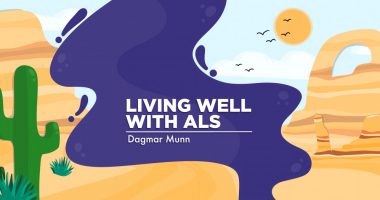Just Another Day in Life With ALS

I inspected the fish through the curved glass of a refrigerated display case. Wild-caught Lake Superior whitefish and trout — both raw and smoked — lay in metal trays.
“I’d like that piece of smoked trout in the middle. Underneath the top one,” I specified. I picked a plump fillet, as they retain the most moisture and are the tastiest.
The seller picked up the piece with a gloved hand and part of the fish flaked off. She added that part to my bag. I purchased raw fillets too, as I often bake fish for my Saturday date night with my husband, Todd.
We usually eat the smoked fish for breakfast the next morning, but I couldn’t wait because I had missed lunch to watch my daughter play in the band at a high school football game. I sampled the smoked trout as soon as I got home, and it was delicious.
I devoured half the fillet, and then thought I better ask Todd if he wanted some before I was tempted to eat it all. I figured he might be hungry, too, because it had been a busy day and I had just fed him a granola bar and some beef jerky before I left for the game.
I went to his office. “I bought smoked fish, and it’s exceptionally good. Do you want some?”
“Definitely,” he said. Todd backed his power wheelchair away from his computer and followed me to the dining room. He elevated his chair and rolled up to his counter-height folding table.
“Do you want me to feed you?” I asked.
“No, thanks,” he said.
Todd has ALS and is paralyzed, but he still likes to feed himself if possible. Some foods are impractical for him to eat on his own — like spaghetti and oatmeal — and sometimes his neck is too weak, or he’s not in a good position in his wheelchair. But when he can, he eats face to plate. Sometimes his head gets stuck, with his chin resting on the plate, and I have to push his head back.
I broke the smoked fish up into manageable chunks and set the plate in front of him. He asked for potato chips, and I added some to the plate.
We chatted while he ate. He looked at me with panic in his eyes. He couldn’t talk.
I sprang into action.
“Should I back you up and do the assist cough?” I read agreement in his face. I backed him up and reclined his wheelchair, preparing to give him a version of the Heimlich maneuver from the front.
He tried to speak, but I couldn’t understand what he was saying. I just knew I was missing something.
“Do you want to lean forward?” I asked. I couldn’t understand his garbled reply. I tilted his wheelchair forward, thinking perhaps he wanted to try to cough on his own with gravity to assist him.
I could tell by the look of frustration on his face and his futile attempts to speak that I wasn’t doing what he wanted. I stopped and leaned in close.
“Lower the elevation,” he whispered.
I pushed the button to lower the elevation of the chair, and Todd’s face told me that I was on the right track. I reclined his chair and compressed his abdomen multiple times, until he was able to speak.
“I aspirated on a piece of potato chip,” Todd said, his voice still weak.
He told me he wasn’t panicked because he could breathe the entire time, but he couldn’t lift his head to operate his wheelchair on his own. Every time he tried to speak, he got a catch in his throat, and he couldn’t communicate that he wanted me to lower his chair so it wouldn’t tip over when I pressed on his abdomen.
Usually when he needs his lungs cleared, he can still breathe, and it has become so rote that we carry on with whatever conversation we were having. Todd got really rattled a couple times when he couldn’t breathe, and obviously couldn’t speak either. Those incidents affected me, too, and I thought that this was another one of those times.
This is our new normal, just another day in life with ALS. I might have a bit of a sense of how people learn to keep living life in war-torn countries with bombs going off. It shows the power of human resilience, but there’s a mental health cost to living on the edge of death.
“That was good fish,” Todd said as he headed back to his office. “It was to die for,” he quipped with a smile.
***
Note: ALS News Today is strictly a news and information website about the disease. It does not provide medical advice, diagnosis, or treatment. This content is not intended to be a substitute for professional medical advice, diagnosis, or treatment. Always seek the advice of your physician or other qualified health provider with any questions you may have regarding a medical condition. Never disregard professional medical advice or delay in seeking it because of something you have read on this website. The opinions expressed in this column are not those of ALS News Today or its parent company, BioNews Services, and are intended to spark discussion about issues pertaining to ALS.








Comments
Vicki Miller
Thank you for sharing this look into what's to come in our future. My husband has been a strong caregiver to me, but I hate the thought of putting him through such a stressful time. Kristen, you are a "hero" for taking charge and showing so much love for your husband and family. Todd, keep up the humor, Kristen needs the encouragement. Be well.
Kristin Neva
Thanks Vicki!